Position documents
At RESONUT, we are clearly focusing our stands on critical issues relating to nutrition and food safety. These documents reflect our commitment to influencing policy, promoting better and fairer practices, and guiding collective action towards the eradication of malnutrition in all its forms.
Objectives of Position Papers
Informing and raising awareness
Raise awareness of critical nutritional issues and their impact on socio-economic development.
Influencing decision-makers
Provide evidence-based recommendations to decision-makers to guide policies and programs.
Mobilizing civil society
Encourage collective action among civil society organizations, communities and individuals to support positive change in nutrition.
Join the Conversation
We are open to dialogue and collaboration. If you would like to discuss any of the points raised in our position papers, share your expertise, or propose joint initiatives, please do not hesitate to contact us.
Together, we can shape a future where nutrition is at the heart of development and well-being for all in Burkina Faso.
Go to Documents
Our position papers are available for consultation and download. We encourage them to be read by all interested parties: decision-makers, development partners, non-governmental organizations, researchers and the general public.
To access these resources, please visit our online library or contact us directly for copies.
Burkinabe recipe booklet (volume 2)
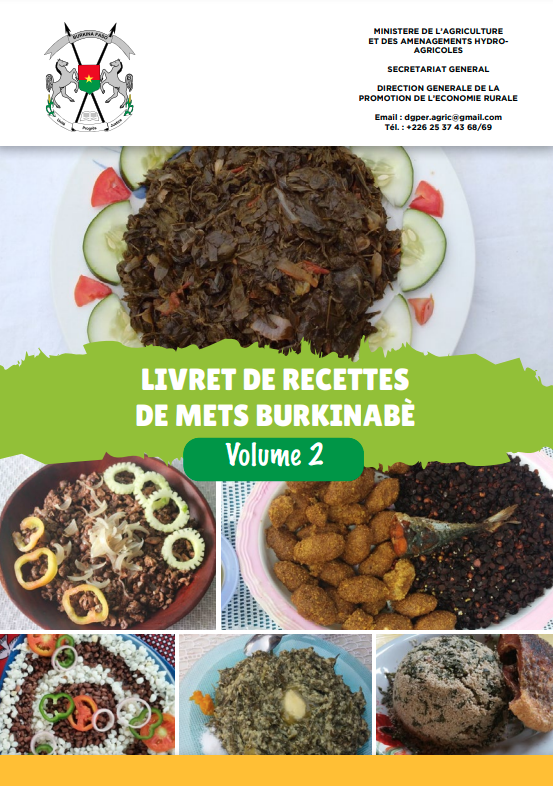
The document in brief
Burkina Faso abounds in a diversity of culinary skills, which unfortunately are often little known and not widely disseminated. It is to fill this information gap that the Ministry of Agriculture, one of whose missions is to promote the consumption of dishes based on national products, has taken the initiative of providing you with this recipe booklet, the use of which could contribute to improving the structure of your food consumption. This booklet gives you the opportunity to discover the richness, diversity and innovation of Burkina Faso’s culinary arts.
Burkinabe recipe booklet (volume 1)
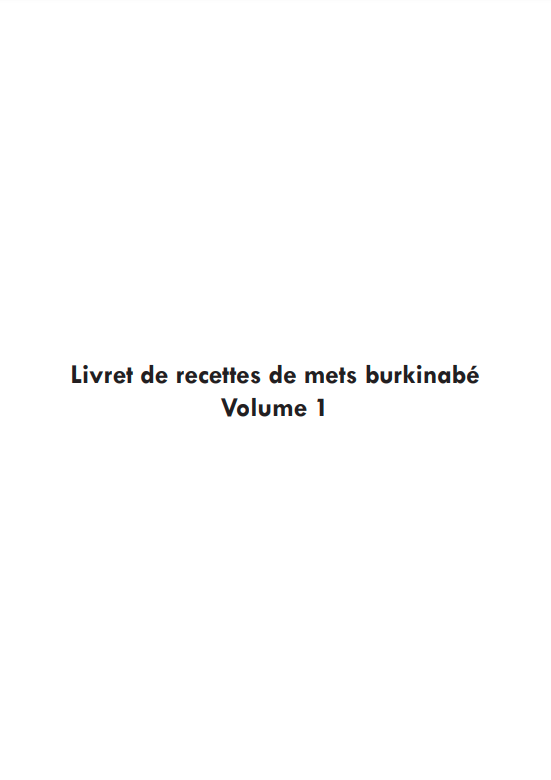
The document in brief
Burkina Faso abounds in a diversity of culinary skills, which unfortunately are often little known and not widely disseminated. It is to fill this information gap that the Ministry of Agriculture, one of whose missions is to promote the consumption of dishes based on national products, has taken the initiative of providing you with this recipe booklet, the use of which could contribute to improving the structure of your food consumption. This booklet gives you the opportunity to discover the richness, diversity and innovation of Burkina Faso’s culinary arts.
Synthesis of the (PNMN) with its Strategic Plan in national languages
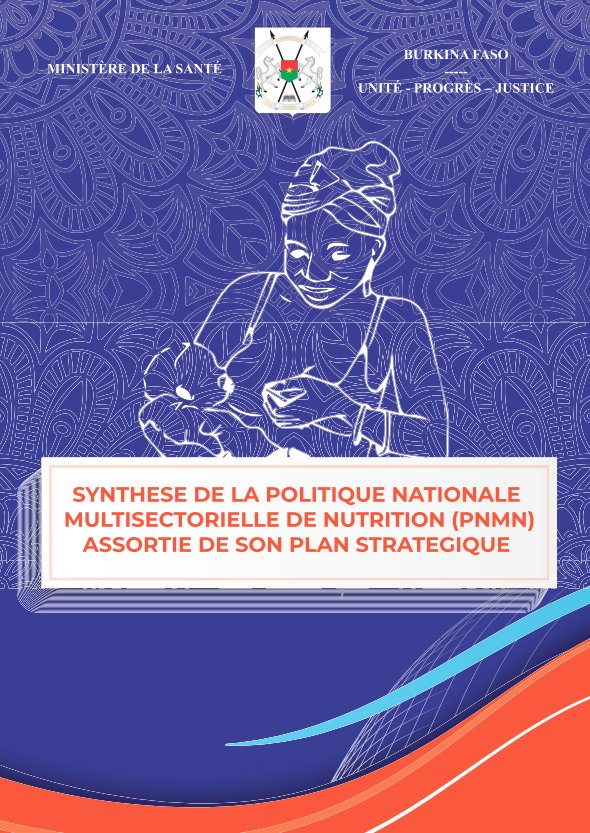
The document in brief
The Politique Nationale Multisectorielle de la Nutrition (PNMN), a governance reference framework adopted in 2020 and little known until then, is being taught to communities in the East, North and Centre-North regions of Burkina Faso, for better appropriation and understanding.
To date, the PNMN has struggled to become operational, as it has not been mastered by the various players, including civil society organizations (CSOs), community-based organizations (CBOs) and the communities themselves.
To remedy this situation, the Réseau de la Société Civile pour la Nutrition (RESONUT) and the Association Monde Rural (AMR), through the R2G consortium, have initiated the synthetic edition of the PNMN in French and local languages (Mooré, Gulmantchéma and Fulfuldé).
Synthesis of the (PNMN) with its Strategic Plan in national languages

The document in brief
The Politique Nationale Multisectorielle de la Nutrition (PNMN), a governance reference framework adopted in 2020 and little known until then, is being taught to communities in the East, North and Centre-North regions of Burkina Faso, for better appropriation and understanding.
To date, the PNMN has struggled to become operational, as it has not been mastered by the various players, including civil society organizations (CSOs), community-based organizations (CBOs) and the communities themselves.
To remedy this situation, the Réseau de la Société Civile pour la Nutrition (RESONUT) and the Association Monde Rural (AMR), through the R2G consortium, have initiated the synthetic edition of the PNMN in French and local languages (Mooré, Gulmantchéma and Fulfuldé).
Synthesis of the (PNMN) with its Strategic Plan in national languages

The document in brief
The Politique Nationale Multisectorielle de la Nutrition (PNMN), a governance reference framework adopted in 2020 and little known until then, is being taught to communities in the East, North and Centre-North regions of Burkina Faso, for better appropriation and understanding.
To date, the PNMN has struggled to become operational, as it has not been mastered by the various players, including civil society organizations (CSOs), community-based organizations (CBOs) and the communities themselves.
To remedy this situation, the Réseau de la Société Civile pour la Nutrition (RESONUT) and the Association Monde Rural (AMR), through the R2G consortium, have initiated the synthetic edition of the PNMN in French and local languages (Mooré, Gulmantchéma and Fulfuldé).
Synthesis of the (PNMN) with its Strategic Plan in national languages

The document in brief
The Politique Nationale Multisectorielle de la Nutrition (PNMN), a governance reference framework adopted in 2020 and little known until then, is being taught to communities in the East, North and Centre-North regions of Burkina Faso, for better appropriation and understanding.
To date, the PNMN has struggled to become operational, as it has not been mastered by the various players, including civil society organizations (CSOs), community-based organizations (CBOs) and the communities themselves.
To remedy this situation, the Réseau de la Société Civile pour la Nutrition (RESONUT) and the Association Monde Rural (AMR), through the R2G consortium, have initiated the synthetic edition of the PNMN in French and local languages (Mooré, Gulmantchéma and Fulfuldé).
Capitalizing on the experience of the Change-Act-Progress (CAP) project
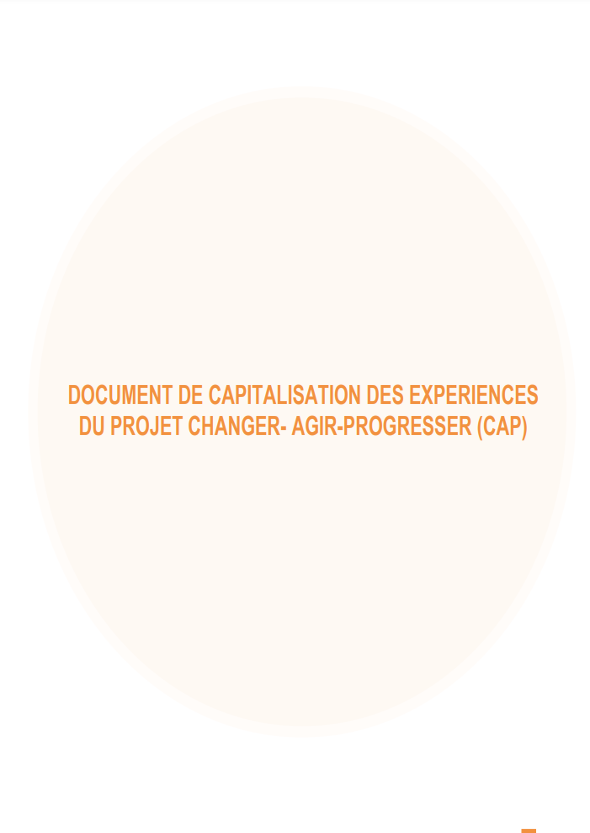
The document in brief
Committed to coordinating civil society efforts to improve the nutritional status of populations, in order to make Burkina Faso a country free from hunger and malnutrition, RESONUT has received financial support from the Bill & Melinda Gates Foundation.
The aim of this financial support is to contribute to the reduction of malnutrition in Burkina Faso through the implementation of specific, targeted grassroots advocacy and communication actions.
This grant, in accordance with contractual agreements with the foundation, was used to develop advocacy materials for accurate and appropriate public information and communication for RESONUT communities and members, and to conduct advocacy for public policies and governance.
for people suffering from malnutrition. It was implemented through the
“Changer-Agir- Progresser (CAP) pour un Burkina Faso sans malnutrition”, a three (3) year project with the vision of: “Make Burkina Faso a country free of hunger and malnutrition”.
The overall aim of the project was to :
- Strengthen the capacities of RESONUT members for effective and efficient advocacy to influence political and economic decision-makers in favor of nutrition in Burkina Faso.
Specifically, the implementation of the project was guided by the following objectives:
- Improving governance for nutrition at national and decentralized levels ;
- Encourage the government of Burkina Faso to allocate more adequate and domestic funding for nutrition and to put in place a viable national accountability mechanism;
- Strengthen RESONUT’s organizational, technical and management capacities and make it self-sufficient.
RESONUT has initiated a capitalization study to “document the experiences (good practices) of the “CAP” project and ensure the project’s visibility in Burkina’s 05 regions and at national level.
Note to the President of the National Assembly of Burkina Faso
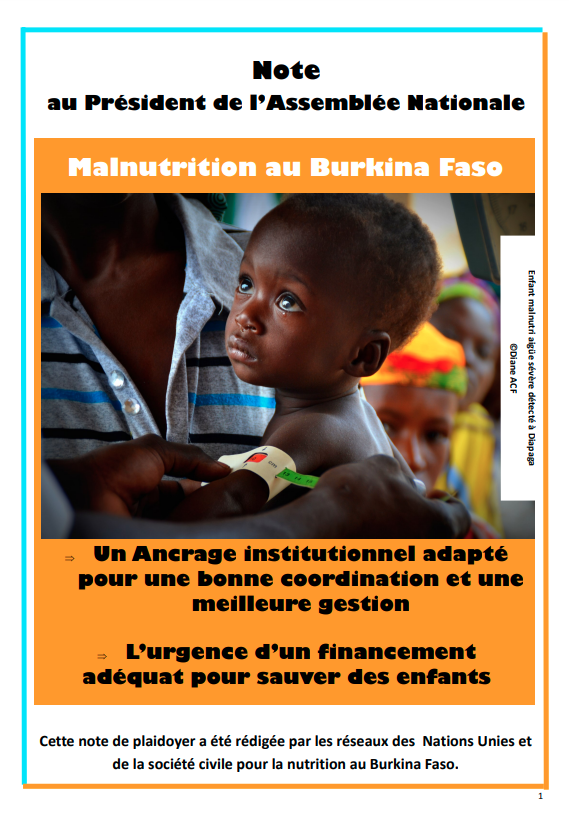
The document in brief
This advocacy note was written by the United Nations and civil society networks for nutrition in Burkina Faso.
In the press
World Food Day 2016
Food and nutrition are fundamental human rights for every individual. To mark the celebration of World Food Day on October 16, the Civil Society Nutrition Network (RESONUT), created in 2014 and made up of 31 NGOs and development associations operating throughout the country, is calling on the Burkinabe government and other stakeholders to make greater financial commitments to the nutrition of Burkinabe people, particularly the most vulnerable, who are children under five, pregnant and breastfeeding women.
“The climate is changing, so is food and agriculture” is the theme chosen by the Food and Agriculture Organization of the United Nations (FAO) for World Food Day 2016. This theme is directly in line with the distress signals sent out since 1992 in Rio concerning global warming. These concerns were renewed at the 2015 Paris climate conference (COP 21). The key challenge of this meeting is to limit global warming to between 1.5°C and 2°C by 2100. The effects of climate change, including flooding, frequent droughts and desertification, will increase if nothing is done! The poor nutritional situation of sub-Saharan populations such as Burkina Faso will take a further hit.
One in 2 children who die has suffered from malnutrition
Burkina Faso is increasingly suffering the effects of climate change, which is having an impact on its agriculture, an important component of nutritional security. Indeed, the nutritional situation in Burkina Faso presents worrying figures. The 2015 prevalence of global acute malnutrition (low weight for height) was 10.4%, compared with 8.6% in 2014. The prevalence of chronic malnutrition, meanwhile, is falling slightly, from 35% in 2010 to 30.2% in 2015 (1). More than a million children under the age of 5 suffer from chronic malnutrition (short stature for age). One child in 10 suffers from acute malnutrition and is at high risk of death. This represents around 500,000 children.
The fight against malnutrition: RESONUT calls on all stakeholders to continue their efforts
Rio de Janeiro is hosting this August 4, 2016, the Nutrition for Growth II event to remind countries of the importance of meeting their nutrition commitments and push them to make their financial and political pledges more specific. The Burkina Faso Civil Society Nutrition Network was not left out of the celebrations. Like other countries in the African zone, it held a press conference in Ouagadougou. Objective: To publicize the civil society declaration on the fight against undernutrition in West Africa, Chad and the Democratic Republic of Congo. Madagascar.
“Despite the efforts made by the governments of West Africa, Chad and Madagascar, the situation remains extremely worrying in West and Central Africa, where 5.9 million children under the age of five are likely to suffer from acute malnutrition this year, including 1.9 million in its severe form, if appropriate remedies are not found”, reads the civil society statement on the fight against undernutrition in West Africa, Chad and Madagascar. It was made public by the civil society network for nutrition (RESONUT) at a press conference, this August 4, 2016 in Ouagadougou.
“The aim of this meeting is to advocate for the issue of malnutrition to be taken into account by all stakeholders, whether at state or organizational level, so that in the short, medium and long term we can kick-start this problem in our nations”, said Aimé Parfait Coulidiaty, acting president of the Civil Society Network for Nutrition (RESONUT).
To this end, he invited countries to invest heavily in nutrition-sensitive and nutrition-specific interventions. “We, civil society from West Africa, Chad and Madagascar, call on governments to take urgent action. Act for life. Act to reverse the trend. Act to write a new page in the history of children in Africa, to pass on to future generations (…)”, he declared. She also recommended that the governments of the countries concerned organize a high-level regional conference to adopt strong financial commitments by 2017; to guarantee adequate funding for nutrition by devoting at least 3% of their budgets to nutrition by 2020, among other things.
In the same vein, Mr. Coulidiaty reaffirmed civil society’s commitment to working alongside governments in the fight against undernutrition, and to playing its part to the full. “African civil society undertakes to support and accompany the formation and implementation of a national policy for nutrition and improvement through multi-stakeholder dialogue spaces by 2018; to ensure budget monitoring of nutrition with effective involvement of communities and parliamentarians at national and regional levels by 2018”, he reassured, before continuing: “It also undertakes to encourage governments to make quantified commitments in favor of nutrition by 2020 and to contribute to the mobilization of resources, notably through innovative financing (…)”.
Malnutrition persists in Burkina Faso despite government efforts
Malnutrition is a public health and nutrition issue, but above all a global development issue involving several sectors (health, agriculture, water, etc.). Despite the efforts made by the government and its partners, various forms of malnutrition remain at high levels in Burkina Faso. As proof, said the president of RESONUT, more than a million children under the age of 5 suffer from chronic malnutrition; one child in 10 suffers from acute malnutrition and is at high risk of death; one child in 2 who dies in Burkina Faso has also suffered from malnutrition. As for the 2015 prevalence of global acute malnutrition, he announced that it was 10.4% compared with 8.6% in 2014. As for the prevalence of malnutrition, it has fallen slightly, from 35% in 2010 to 30.2% in 2015.
RESONUT is a group of 31 civil society organizations working towards the vision of making Burkina Faso a country free of hunger and nutrition. The aim of this structure is to ensure the consultation and coordination of civil society committed to improving the nutritional status of Burkinabè populations.
Aïssata Laure G. Sidibé
Lefaso.net
RESONUT: so that no child dies from malnutrition
The Civil Society Nutrition Network (RESONUT) is taking part in the Salon International de l’Enfant et de l’Adolescent, which opened on November 17. On this occasion, he tells us why they are taking part in the show, and what impact it could have on their target audience.
Created as part of the Scalling Up Nutrition (SUN) movement to strengthen nutrition. Burkina Faso joined this international movement in 2011, and in 2014 the civil society network for nutrition (RESONUT) was created. It is made up of some thirty national and international NGOs, chaired by the NGO Action contre la faim (ACF).
According to ACF’s advocacy manager, Hermann GOUMBRI, the network intends to take up several challenges in the field of nutrition in Burkina Faso. “We advocate nutrition in order to encourage political and economic decision-makers to invest more politically and, above all, financially in the field of nutrition, to promote the nutrition of children and all Burkinabe in general,” he said.
In his view, the network’s aim in taking part in SINEA is to make itself known to the general public through a range of nutrition messages. He went on to say that a multi-level study was carried out on nutrition in Burkina Faso. However, we intend to make the results public by the end of November 2016.. And this, with a view to revealing the involvement of the country and its various technical and financial partners in the field of nutrition “. In conclusion, Hermann GOUMBRI called on the various authorities concerned to take a positive look at the state of nutrition in Burkina Faso. He called for a contribution of at least 3% of the national budget to be devoted to nutrition. For this reason, he insisted on the need to advocate and increase financial investments in Burkina Faso in favor of nutrition. ” As nutrition is the cornerstone of a country’s development, it’s our duty to ensure that it is taken into account. We disapprove of the fact that nowadays children die from malnutrition, which is deplorable for a country that claims to be sovereign. “concluded Hermann GOUMBRI.
The fight against malnutrition: RESONUT takes stock of its studies
“Making Burkina Faso a country free of hunger and malnutrition” is the vision of the Civil Society Network for Nutrition in Burkina Faso (RESONUT). As part of its advocacy project entitled “Burkina Faso’s commitment to nutrition, RIO 2016”, the network conducted three studies. The results were presented this Tuesday, December 6, 2016 in Ouagadougou.
Burkina Faso’s nutrition commitments, state allocations and expenditure for nutrition-specific and nutrition-sensitive interventions from 2014 to 2015, disbursements from technical and financial partners in favor of nutrition-specific and nutrition-sensitive interventions. The results of the research carried out by the Réseau de la société civile pour la nutrition au Burkina Faso (RESONUT) were presented at the workshop.
“RESONUT supports the Ministry of Health and the government in its fight against malnutrition. RESONUT’s actions are significant. In less than three years of existence, RESONUT has taken action to support Burkina’s commitments in terms of nutrition,” said Bertine Ouaro, Director of Nutrition. According to him, over a million Burkinabe children suffer from chronic malnutrition.
Malnutrition remains a public health problem in Burkina Faso. The nutritional situation continues to give cause for concern, and the prevalence of various types of malnutrition is still high. The prevalence of global acute malnutrition was 10 ,4% in 2015 with 2 ,2% of severe form, that of chronic malnutrition was 30,2%.
Research results
“We’re waiting for the three pieces of research that have been carried out to provide food for thought, and to really decide which are the most relevant recommendations we need to build on moving forward,” emphasized Marc Sekpon, President of RESONUT.
Studies carried out by the Civil Society Nutrition Network show that Burkina Faso has adopted strategies to improve the nutritional status of the population. A goal in keeping with the missions the network has set itself.
Among other commitments, Burkina Faso joined the international Scaling up nutrition movement in 2011, and is committed to the Sustainable Development Goals. At national level, Burkina has developed a multisectoral nutrition plan (2016-2020), including commitments of financial and human resources to support specific nutrition-sensitive interventions. These instruments helped reduce the prevalence of underweight from 26% to 23% among children under 5 from 2009 to 2015.
With regard to the analysis of budget allocations in favor of nutrition, the study revealed that the resources allocated by the government to improving the nutritional situation are 8.848 billion CFA francs, or 0.61% of the State budget (excluding external funding over the 2014-2015 period). These resources are “relatively small”, and most of the “projects and programs that have a direct impact on nutrition are very limited”.
As for disbursements by technical and financial partners for specific nutrition-sensitive interventions, the study showed that addressing this concern is mainly dependent on external players, with little domestic investment. In fact, over the period 2014-2015, more than 62.83 billion CFA francs were disbursed per year by TFPs to finance nutrition projects in Burkina Faso.
The Civil Society Network for Nutrition in Burkina Faso (RESONUT) is a group of 31 civil society organizations. Our member organizations are active in the health, nutrition, water, hygiene and food safety sectors.
Nicole Ouédraogo
Lefaso.net
